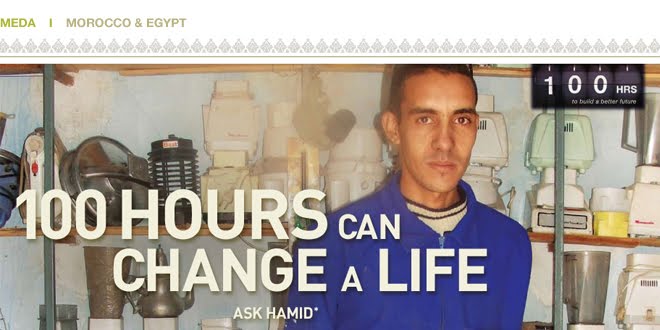Leah Katerberg, this week's guest blogger, shares some experiences of a YouthInvest training session from her recent trip to Morocco.I’m in Morocco to conduct our annual survey, but we’ve adjourned for the day and I’ve decided to sit in on a training session for 100 Hours to Success. The youth are just beginning the module on saving. Let me show you what they’re learning:
The trainer starts by guiding them in a discussion on the general goals of saving. All contributions are posted on the wall, and together the youth categorize

them into three broad uses for savings:
1. Events (eg. wedding)
2. Unknown future expenses (eg. appliance repair)
3. Business opportunity (income generation)
The youth are now formed into groups of about five, each representing a family, and are provided relevant information on the family’s assets, expenses, income, and also a set of challenges to solve.
For example, the family’s father may have been diagnosed with a hearing problem, so the family must save for the purchase of a hearing aid; the oldest daughter is graduating from high school next year and would like to pursue college-level education; the mother owns a sewing business and has had to turn down certain types of work because of the limitations of her machine.
Together, each ‘family’ decides how much they can save per month based on their current situation. The youth understand this often requires sacrifice in expenditures, however some groups’ creativity went beyond fewer visits to the internet café: “We will sell one of our cows, we can negotiate lower rent with our landlord, we will start a small garden plot and sell vegetables to our neighbors.” Continuing the example above, let’s say our group determines it will be able to save 300 dirhams per month (about $35).
Next, each group completes a savings plan template to enable them to reach their goals. Our group’s looks something like this:

At 300 dirhams per month, the hearing aid can be purchased in less than half a year. Then, the family can start saving for the first year of college for the oldest daughter, which will take about eight months. Once those two goals have been achieved, saving can begin for the sewing machine. Likely, the additional income generated by the new machine will help the family save for subsequent years of college.
As each group confidently shares its plan the twofold message becomes clear: Saving is powerful, and you don’t need to be rich to save.
























